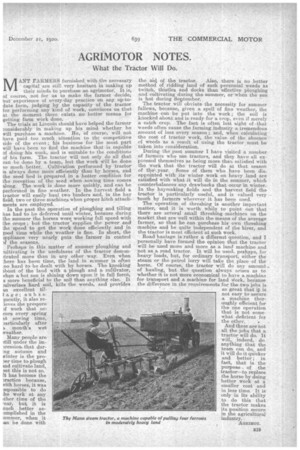AGRIMOTOR. NOTES.
Page 27

If you've noticed an error in this article please click here to report it so we can fix it.
What the Tractor Will Do.
MANY FARMERS furnished with the necessary • capital are still very hesitant in making up . their minds to purchase an agrimotor. It is, of course; . not for us to make the farmer. decide, but experience of every-day practice on any, up-to-[late farm, judging by the capacity of the tractor. for performing any kind of work, convinces us thatat the moment there exists no better means for
getting farm work done. .
The trials ,at Lincoln should have helped the farmer ionsiderably in making up his mind whether he will purchase a machine. He, of course, will not have paid too much attention to the competitive side of the event; his business for the most part willhave been to find the machine that is capable at doing his work, and is suitable 'to the conditions of his farm. The tractor will not only do all that can be done by a team, but the work Will be done so much -better. cultivation performed by tractor is always done moreefficiently than by horses, and the seed bed is prepared in a better condition for the reception of the seed when .sowing time comes along. The work is done more quickly, and can be performed in fine weather. In the harvest field a tractor will easily haul two binders and, in the hay held, two or three machines when proper hitch attachments are employed.
In the past the operation of ploughing and tilling has had to his deferred until winter, because during the summer the horses were,, working full speed with the crops ; but the tractor supplies the power and the speed to get the work chine efficiently and in pod time while the weather is fine. In short, the tppliance very nearly puts the farmer in control A the 'seasons.
. Perhaps in this m-atter of summer ploughing and mitivating is the usefulness of the tractor demon 3trated more than in any other way. Even when :here has been time, the hind in summer is often :co .hard to be dealt with by horses. The knocking • month's wet weather.
Many people are till under the imaression.. that durmg autumn and winter is the proor time to plough tnd cultivate land, 3.1it this is not so. It has become the iractice because, vith horses, it was mpossible to do ;he work at any Ither time of the ,ear, but it is ouch better neomplished in the ;urnmer, when it an be done with
the aid of the tractor. Also, there is no better method of ridding land ofsuch perennial weeds as twitch, thistles and docks than effective ploughing and cultivating during the summer, or when the sun is hot during Seetember. The tractor will obviate the necessity for summer
• fallows, because, given a spell of fine weather, the machine can be put into the work ; the soil is .knocked about and is ready for a crop,. even if merely a catch crop.. The fact. is often lost 'sight of -that -weeds often cause the farming_industry a tremendous amount of loss every season ;, and, when calculating the cost of tractor work, the value of the absence of weeds as a result of using the tractor must be taken into consideration.
During the past summer I have visited a. number of farmers who use tractors, and they have all expressed themselves as being more than satisfied with the work that the tractor will do at that season of the" year. Some . of them who have been disappointed withits winter -work on heavy land are satisfied with what it will do in the summer, which counterbalances any drawbacks that occur in winter. In the haymaking fields and the harvest field the tractor is particularly useful, and is valued very "much by farmers wherever it has been used.
The operation of threshing is another important matter, -and it is worth while to point • Out that there are several small threshing-machines on the market that are well within the means of the average farmer, so that he can purchase hisown threshing machine and be quite independent of the hirer, and the tractor is most efficient at such work.
Road-haulage is rather a different question, and I personally have formed the opinion that the tractor will be used more and more as a land machine and not as. a road tractor. It will be used. peEhaps, for heavy loads, but, for ordinary transport, either the steam or the petrol lorry will take the place of the horse. Of course, the tractor -will do any amount-. ofhauling, but the question always arises as to
i
whether it s not more economical to have a machine for transport and. a machine for land Work, because the difference in the requirements for the two jObs is so great that 4 is not easy to secure a machine thoroughly efficient for the one operation that is not somewhat deficient for the other.
And these are not all the jobs that a tractor will do. It will, indeed, do anything that the team can da,. and it will doit quicker and better ; in fact, that is thepurpose ., of the tractor—to replace the horse by -doing better work at a smaller cost and in less time. It is. only in its ability to do this that the tractor makes its position secure in the agricultural industry.
AGEMMT.
































